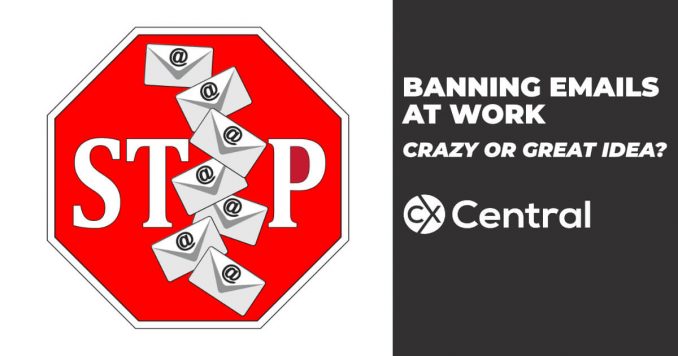
Why Banning Emails at Work isn’t such a crazy idea
“You’re banning emails????? Are you nuts????”.
That’s the thought going through my head as I type out the words Atomic 212, the company that is banning emails at work.
I still remember getting my first email and it was pretty dam exciting!
Not necessarily the content of the email, but the concept of being able to send a message electronically rather than having to send one by fax.
I know a few of you are nodding your head also remembering those days and for the rest of you, you are probably wondering just what century I was born in!
These days when another email comes in (groan) it normally amounts in more work, more reading, more accountability and a range of other issues.
And don’t even get me started on spam mail!
Well, one Australian company, Atomic 212, has decided enough is enough and has shut down all email communication permanently.
That’s right, they are banning emails!
In an article by Frank Chung, Atomic 212’s CEO Jason Dooris makes some strong arguments, and you can read the full article below.
Time will tell if he’s on a winner but we admire him having a go!
This company just banned email permanently
WORK emails have become a curse.
No longer an efficient tool for communication in the workplace, emails encourage people to deflect responsibilities onto others, cause misunderstandings and chain employees to the office no matter where they are.
That’s the view of Jason Dooris, chief executive of Australian advertising company Atomic 212, which has taken the drastic step this week of shutting down all internal email communication permanently.
The initiative, dubbed ‘Talk First’, is aimed at bringing the “energy” back to the office.
Mr Dooris said when he started his working career more than 20 years ago, the office was “abuzz with conversation and people on the phone”. Over time, emails have killed that energy and, he argues, made people less creative as a result.
“When I started there was no formal education on what advertising was,” he said.
“In essence, it was about coming up with a great idea. That came from rubbing shoulders with people in the corridor, hearing people talking next to you, the relationships you formed. That’s what made it exciting. Now when I walk around what I hear is quiet environments because everyone is sending emails.”
Emails lead to what he calls “professional inconsideration”. “In the old world, if I was going to ask you to assist with something like writing a report, I’d walk up to you and talk to you, look you in the eye, and that would engender empathy,” he said.
“When you flick an email you lose that connection.”

Testing the effectiveness of banning emails from work
For the pilot program, Mr Dooris said the company measured five different variables: the amount of time spent communicating directly with clients; the amount of rework required on briefs; the impact on campaign results; the speed with which changes could be implemented to live campaigns; and qualitative feedback from staff about their feelings.
That test, involving around one-third of the company’s 82 employees, led to 30 per cent gains in productivity, according to Mr Dooris.
“This is a big part of making our business stronger while at the same time looking after our people,” he said. “People don’t think creatively and solve problems when they’re unhappy.”
While pundits have been predicting the death of email for more than a decade, it stubbornly lives on. But Mr Dooris believes the channel truly has reached a tipping point.
He’s not a fan of instant messaging services like Slack, feeling they’re too similar to email. He prefers to use simple file-sharing tools like Dropbox, with everything else done over the phone of face-to-face.
“As far as I’m aware we’re the only company in Australia doing this, but I would be very surprised if in 12 months we’re still the only ones,” he said.
Mr Dooris said Atomic 212 was now in discussion with a number of its clients about phasing out email communication externally as well.
“I think behaviourally we’ve lost the ability to manage our own time well as a society,” he said. “It’s no longer possible to manage our time based on the amount of work we need to fit into an average week. That means something needs to change.”
Dr Ben Searle, Senior Lecturer in Organisational Psychology at Macquarie University, said the failure to detach from work had been shown to cause depression, fatigue, exhaustion and poor life satisfaction.
He said Australia was particularly susceptible due to our relatively high number of working hours compared with other countries and being fast adopters of technology, which meant a lot of people were taking work home in the form of emails on their phones.
“The technology we have now is eliminating this barrier between work time and non-work time, so I think Australia is more likely to benefit from improvements in the way we manage this than some other countries,” he said.
But he said improving inter-office communication might not be as simple as cutting out email entirely. “It’s probably a more complex situation than saying this is what all organisations should do,” he said.
“In a large organisation, you can’t expect people to be getting up and walking to different buildings or having to communicate something to a large number of team members over the phone individually.
“But there are probably ways around that and probably better ways of managing that communication process than we do at the moment.”
Recommended further reading: 5 effective tactics to reduce interruptions at work
Discover all the upcoming training courses, industry conferences, networking events, site tours and more on our Industry Events Calendar>>>

Be the first to comment